
Sir Alfred Joseph Hitchcock was an English film director. He is widely regarded as one of the most influential figures in the history of cinema. In a career spanning six decades, he directed over 50 feature films, many of which are still widely watched and studied today. Known as the "Master of Suspense", Hitchcock became as well known as any of his actors thanks to his many interviews, his cameo appearances in most of his films, and his hosting and producing the television anthology Alfred Hitchcock Presents (1955–65). His films garnered 46 Academy Award nominations, including six wins, although he never won the award for Best Director, despite five nominations.

Psycho is a 1960 American horror film produced and directed by Alfred Hitchcock. The screenplay, written by Joseph Stefano, was based on the 1959 novel of the same name by Robert Bloch. The film stars Anthony Perkins, Janet Leigh, Vera Miles, John Gavin and Martin Balsam. The plot centers on an encounter between on-the-run embezzler Marion Crane (Leigh) and shy motel proprietor Norman Bates (Perkins) and its aftermath, in which a private investigator (Balsam), Marion's lover Sam Loomis (Gavin), and her sister Lila (Miles) investigate her disappearance.
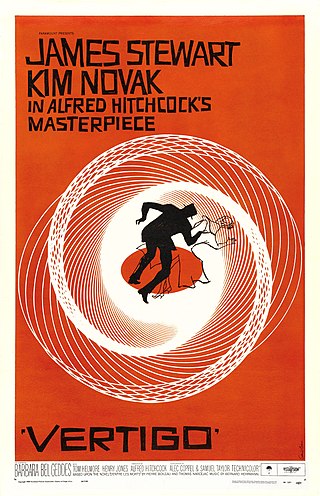
Vertigo is a 1958 American psychological thriller film directed and produced by Alfred Hitchcock. The story was based on the 1954 novel D'entre les morts by Boileau-Narcejac. The screenplay was written by Alec Coppel and Samuel A. Taylor. The film stars James Stewart as former police detective John "Scottie" Ferguson, who has retired because an incident in the line of duty has caused him to develop acrophobia accompanied by vertigo, a false sense of rotational movement. Scottie is hired by an acquaintance, Gavin Elster, as a private investigator to follow Gavin's wife, Madeleine, who is behaving strangely.
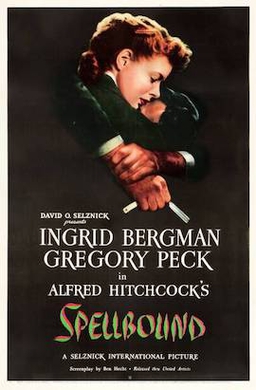
Spellbound is a 1945 American psychological thriller directed by Alfred Hitchcock, and starring Ingrid Bergman, Gregory Peck, and Michael Chekhov. It follows a psychoanalyst who falls in love with the new head of the Vermont hospital in which she works, only to find that he is an imposter suffering dissociative amnesia, and potentially, a murderer. The film is based on the 1927 novel The House of Dr. Edwardes by Hilary Saint George Saunders and John Palmer.
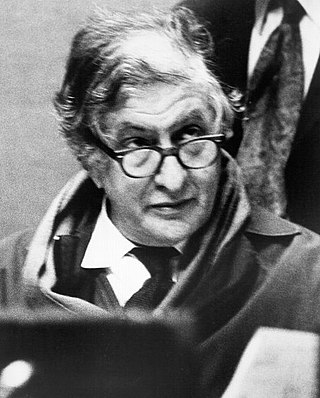
Bernard Herrmann was an American composer and conductor best known for his work in composing for films. As a conductor, he championed the music of lesser-known composers. He is widely regarded as one of the greatest film composers. Alex Ross writes that "Over four decades, he revolutionized movie scoring by abandoning the illustrative musical techniques that dominated Hollywood in the 1930s and imposing his own peculiar harmonic and rhythmic vocabulary."
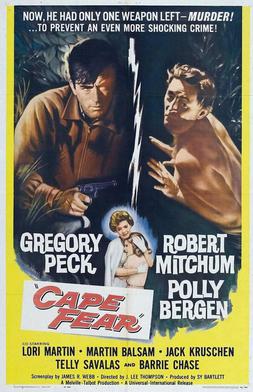
Cape Fear is a 1962 American noir psychological thriller film starring Gregory Peck, Robert Mitchum, and Polly Bergen. It was adapted by James R. Webb from the 1957 novel The Executioners by John D. MacDonald. The picture was directed by J. Lee Thompson from storyboards devised by original director Alfred Hitchcock and released on April 12, 1962. The film concerns an attorney whose family is stalked by a criminal he helped to send to jail. The supporting cast features Martin Balsam, Telly Savalas and Barrie Chase.

Alfred Hitchcock Presents is an American television anthology series created, hosted and produced by Alfred Hitchcock, airing on CBS and NBC, alternately, between 1955 and 1965. It features dramas, thrillers, and mysteries. Between 1962 and 1965 it was renamed The Alfred Hitchcock Hour. Hitchcock himself directed only 18 episodes during its run.

John Michael Hayes was an American screenwriter, who wrote four of Alfred Hitchcock's films in the 1950s.
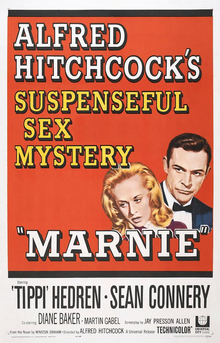
Marnie is a 1964 American psychological thriller film directed by Alfred Hitchcock from a screenplay by Jay Presson Allen, based on the 1961 novel of the same name by Winston Graham. The film stars Tippi Hedren and Sean Connery.
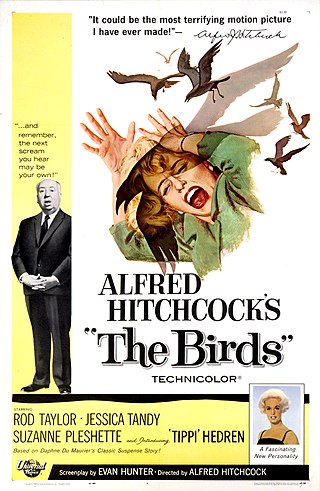
The Birds is a 1963 American natural horror-thriller film produced and directed by Alfred Hitchcock, released by Universal Pictures. Loosely based on the 1952 short story of the same name by Daphne du Maurier, it focuses on a series of sudden and unexplained violent bird attacks on the people of Bodega Bay, California, over the course of a few days.

John Forsythe was an American stage, film/television actor, producer, narrator, drama teacher and philanthropist whose career spanned six decades. He also appeared as a guest on several talk and variety shows and as a panelist on numerous game shows.
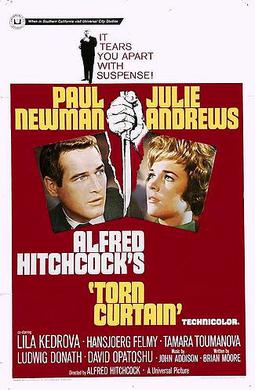
Torn Curtain is a 1966 American spy political thriller film directed by Alfred Hitchcock, and starring Paul Newman and Julie Andrews. Written by Brian Moore, the film is set in the Cold War. It is about an American scientist who appears to defect behind the Iron Curtain to East Germany. It is the first of Hitchcock's films to be released without a score by Bernard Herrmann, after the end of their collaboration.

The Wrong Man is a 1956 American docudrama film noir directed by Alfred Hitchcock and starring Henry Fonda and Vera Miles. The film was drawn from the true story of an innocent man charged with a crime, as described in the book The True Story of Christopher Emmanuel Balestrero by Maxwell Anderson and in the magazine article "A Case of Identity", which was published in Life magazine in June 1953 by Herbert Brean.

The Man Who Knew Too Much is a 1956 American mystery thriller film directed and produced by Alfred Hitchcock, starring James Stewart and Doris Day. It is Hitchcock's second film using this title, following his own 1934 film of the same name but featuring a significantly altered plot and script.

Psycho is a 1998 American psychological horror film produced and directed by Gus Van Sant, and starring Vince Vaughn, Julianne Moore, Viggo Mortensen, William H. Macy, and Anne Heche. It is a modern remake of Alfred Hitchcock's 1960 film of the same name, in which an embezzler arrives at an old motel run by a mysterious man named Norman Bates; both films are adapted from Robert Bloch's 1959 novel.
Hitchcock & Herrmann is a play written by David Knijnenburg which examines the relationship between film director Alfred Hitchcock and musical composer Bernard Herrmann.
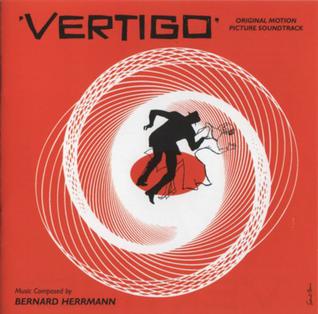
The music score for Alfred Hitchcock's 1958 film Vertigo was composed by Bernard Herrmann between 3 January and 19 February 1958. The recordings were made in London and Vienna, with orchestra conducted by Muir Mathieson. A musicians' strike had prevented the score from being recorded in Los Angeles with Herrmann conducting.
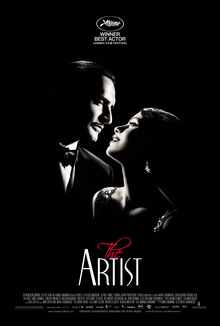
The Artist is a 2011 French comedy-drama film in the style of a black-and-white silent film or part-talkie. The film was written and directed by Michel Hazanavicius, produced by Thomas Langmann and stars Jean Dujardin and Bérénice Bejo. The story takes place in Hollywood, between 1927 and 1932, and focuses on the relationship between a rising young actress and an older silent film star as silent cinema falls out of fashion and is replaced by the "talkies".
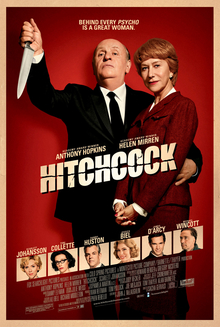
Hitchcock is a 2012 American biographical romantic drama film directed by Sacha Gervasi and based on Stephen Rebello's 1990 non-fiction book Alfred Hitchcock and the Making of Psycho. Hitchcock tells the story of the relationship between Alfred Hitchcock and his wife, Alma Reville, during the filming of Psycho in 1959. Hitchcock premiered at the AFI Fest on November 1, 2012 and was released in the United States on November 23 by Fox Searchlight Pictures. It grossed $27 million against a $15 million budget.
Varèse Sarabande is an American record label that is owned by Concord Music, which specializes in film scores and original cast recordings.



















